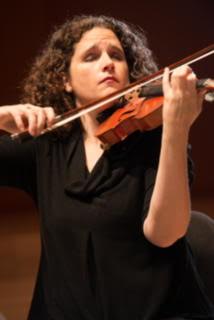Playing with Sir Simon is all passion and precision. Now I get back to grit
mainOur diarist Anthea Kreston just had her second big night in the Berlin Philharmonic. Just to remind you: she’s an American in Berlin, member of an international string quartet and an adventurous string trio, mother of two, and she can’t resist the lure of new musical experiences. Read on…

This week I had the spectacular pleasure of working under the baton of Sir Simon Rattle, as a substitute violist in the Berlin Philharmonic. A feeling of utter warmth and confidence exudes from him – passion and precision are perfectly married. I felt enveloped in his warm smile, his inclusivity. I was able to chat with him a couple of times – he asked after the Schumann quartet music I am researching. I was on Cloud 9.
As we pack our car for the summer trip, I am eager to dig in, once again, to piano trio repertoire as our Amelia Piano Trio, crippled and barely surviving this immense life change to our new career and circumstances in Germany, begins a relaunch. This is our time together – two weeks in the Dolomite mountains of Northern Italy, with six new trios to learn and perform. We have plans for this coming year – concerts and projects in Europe. I think we can balance it all – I know we can.

Which brings me to grit. I was reading about success the other week, and came across something interesting. Angela Lee Duckworth is an American academic, psychologist and popular science writer, and recipient of the MacArthur Genius Grant. Her studies about success have turned previous conclusions on their head – her conclusion – success comes down to one factor – whether the person has grit. Forgot about all that other stuff – the Five Personality model (openness to experience, conscientiousness, extraversion, agreeableness and neuroticism). Now you only need one thing – Grit. That seems much easier. You can have that, regardless of income, background, education. We don’t know how to get it, but I do have an idea. Learn to play the violin. Tell me if I am wrong – doesn’t this perfectly describe all of the things a person must have to learn an instrument (it doesn’t even mean the person does it well – that is beside the point).
Grit is, according to Wikipedia, “perseverance and passion for long-term goals.” Sure – ability helps, but, as Dr. Suzuki believed, music is just a tool by which to become a better person – music is food for the soul irregardless of ability.
Duckworth and colleagues studied famous leaders from history, and although high achievers had special abilities, it was the next step – “zeal” and “persistence of motive and effort” which drove them towards something spectacular.
Grit is also something which does not require positive feedback – it is a stable, inherent thing. People with grit can stay focused on very difficult things over very long periods – failure is seen as temporary – adversity is expected. Passion drives them – they can steer through the setbacks because they believe in themselves, or in their goals.
Jason has a belief that, if every sitting American president were required to give one, live (tv) violin recital per year, they would understand the true meaning of fear, responsibility, intricate planning and courage. Even book 1 Suzuki would be a huge challenge.
So what do we learn through music? Grit. Courage. Fearlessness. Generosity. Planning. Failure. Passion. And some pretty darned good tunes.





No such word as “irregardless,” Anthea – regardless being the correct word. As a former 7th Army Symphony violinist who played concerts in the Hochschule before the Philharmonie was built and a retired musician who’s returned to Berlin to visit, I’m enjoying your articles.
You may wish to amend your comment, NYMIKE: https://www.merriam-webster.com/dictionary/irregardless
So what, Charles? Higher quality dictionaries do not include the word for obvious reasons. Heaven forbid we use every word in this (American) dictionary.
Correction was to phrase “no such word.” Certainly you are correct that there are better word choices; that was not the point of the response to NYMike.
The word which springs to mind would be “irrespective”, but times are changing!! Not necessarily for the better, it has to be said.
‘Words, words, words.’
[Hamlet 2.2, 192]
https://aeon.co/ideas/teaching-grit-is-bad-for-children-and-bad-for-democracy
Oh my goodness – if you could just see the number of emails I get from my mother about my grammar! I try to blame as much as i possibly can on autocorrect, let’s just pretend that is why I don’t know about regardless/irregardless – but My thumbs did hesitate for just a moment as i wrote that. I also, apparently, don’t know about commas, apostrophe’s, things with Latin roots, when to capitalize, and I just can’t, for the life of me, figure out how to spell so many words. Argh. Fnert?
As long as you keep countering sporadic grammatical errors in your writing with consistent eloquence and articulateness in your music making, all is forgiven 😉
This is a wonderful article. Makes me want to watch a John Wayne movie.
‘The Searchers’. Very much grit.
If Anthea gets her grammar wrong again she ‘may well hear from my lawyer, J. Noble Daggart” (‘True Grit’):-)
” ….music is food for the soul irregardless of ability.” I like this a lot. So true.
Ah, Anthea, I think you forget that your mother reads these weekly missives fairly regularly. I have not commented before, but after at least a couple of references to my many (?) comments on your grammar (which you, as you may remember, asked me to make), I now feel compelled to defend myself. I guess I can lay blame squarely on the shoulders of Miss Berquist, my 7th grade English teacher, who drilled her classes on participles, gerunds, sentence diagramming and heaven knows what else to the point that much of it still sticks with me lo these many years later. And hey, I do take credit for the fact that you are one of the few who know the difference between alumna, alumnus, alumnae and alumni, so there! Now, as to irregardless, it’s quite easy to track down on the internet as one of your readers has already pointed out, but in the annals of grammatical mistakes I’d put it quite far down the list of importance inasmuch as it’s one of those American colloquialisms that over time gradually gets accepted into the general English/American canon. However, the “ir” is totally superfluous and adds nothing to the meaning. All that is needed is “regardless”. Finally, I enthusiastically join your chorus of admirers who find your writing witty, engaging, and fascinating, and I also join those who encourage you to compile these writings into a book chronicling your fascinating journey from rural Oregon to one of, it not the, musical capitals of the world.
Your mom, Jeannette
Dear Jeannette
Very nice to meet you. Is that not a misplaced plural in the final word of the pre-penultimate line? best wishes, The Editor.
Ha ha you guys!
Dear Norman,
Nice to meet you as well, and thank you for teaching me a new word — “prepenultimate”! Should an occasion arise when I need to impress, I now have this in my bag of tricks. Now, if you want to go back yet another step, according to Kevin Beach, senior editor of British English, there is also anteprepenultimate, meaning third from last, but he says that it, as well as the pre version, are rare. But I doubt either of us will have the need to use either one! Best, Jeannette